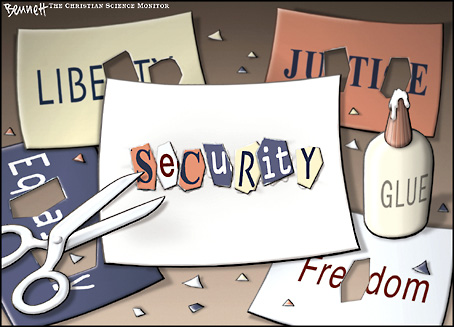The hypocrite’s crime is that he bears false witness against himself. What makes it so plausible to assume that hypocrisy is the vice of vices is that integrity can indeed exist under the cover of all other vices except this one. Only crime and the criminal, it is true, confront us with the perplexity of radical evil; but only the hypocrite is really rotten to the core.~ Hannah Arendt, On Revolution, 1963
Fidel Castro Resigns; US Sanctions Fail
I posted on Twitter this morning about Fidel Castro’s resignation as president of Cuba and commander-in-chief of Cuba’s military.
I heard the news in the morning, and thought about posting it on the blog, but I didn’t really have much to say about it. It’s hard to really judge a person like Fidel Castro who is seen as a hero by so many people and a hated dictator by so many others; it’s obvious both sides have credible and real points; in the end, all I hope for is for things to get better for the Cuban people, whether it be from the sanctions or from his rule.
Anyway, what made me change my mind and write about it is this entry by Jon Swift, titled: Castro Resigns! Sanctions Work!
I just couldn’t believe the logic behind it; this person and several commenters on his blog actually think the US sanctions worked and that they were behind Fidel Castro finally giving up and resigning.
Just a few facts: The U.S. has been trying to get rid of Fidel Castro for 50 years now, 10 U.S. administrations have tried to topple him, there have been 638 assassination attempts against him, strict sanctions have been imposed on the country; and nothing worked.
To even suggest that the sanctions are what made Fidel Castro take this decision is unrealistic, laughable, and naive.
Plus, what about his decision is a victory for the U.S.?
I don’t think they were against Fidel as a person, but rather against his regime; will it make any difference under his brother Raul’s rule?
The man is only leaving because he’s a step away from the grave; he’s been seriously ill for a few years now; and everyone has been expecting to hear about him passing away anytime now.
Sanctions don’t work! Period!
All they do is ruin the lives of millions of citizens, while helping the rulers/dictators strengthen their grip on the country and make things even worse.
Sanctions haven’t worked in Cuba, they haven’t worked in Iraq, they didn’t work in Libya, they’re not working in Iran, nor are they working in Zimbabwe, …etc.
The US sanctions were/are a failure; Fidel Castro finally left of his own free will; after all he could have chosen to rule until his death.
One Person, Different Profiles
A thought that has been on my mind these past few days and that I thought I’d finally try to put down in writing, maybe in an attempt to sort out my ideas, and save them for future reference.
The thing is that on most of these web services where you have to setup your profile; whether it be a social networking site, a job site, or any other kind of service; and even offline; whether it be a CV, a business card or presentation; you always end up with a one dimensional profile of yourself, just one way of presenting yourself from just one point of view.
But is that enough?
Are we as humans really that simple, straightforward or even that dull?
I don’t really think so.
We exist in different contexts and move around in different circles in our everyday lives, and it’s impossible to believe that one profile totally covers us and describes us best everywhere, every time, with everyone.
Personally, at my current job, in professional meetings, IT discussions, and generally in that IT related context, I’m the product development manager who has years of experience in the field.
When I’m with a certain group of my friends, I’m a passionate photographer, who’s always trying out new techniques, playing around with new perspectives and building up a portfolio of interesting shots.
With others in different contexts like meetups, some conferences, some interviews; I’m known as a blogger, Subzero Blue, one of the first Tunisian bloggers, who has been blogging for years now and in some way or another helped spread blogging in Tunisia.
These are all different points of view that show a different side to the same person; and there are still more now; there were others before and there’ll be others to come.
So are the simple profile systems we have in place today truly representative of who we are as human beings?
Of course, if you’re already in a specialized context, then that’s no problem, you’re going to choose the profile that fits the most; but when it comes to more general services, it’s just not enough.
Simply put, the same person can answer the same question “Who are you?” with a range of different answers depending on the situation, the context, the where, and the when.
Profiling systems just have to take all those different answers into consideration.
New Wind Farms To Be Built Throughout Tunisia
Some more good eco-friendly news from Tunisia…
Tunisia’s wind power energy strategy aims at increasing the total electricity production resulting from this non polluting form of energy to 175 MW by 2010, thus amounting to some 4,2% of the electricity production in the country.
[…]
… the Tunisian government has so far pledged some 18 million dollars of funds for setting up the project.
[Source: Tunisia Online News]
Tunisia already has one wind farm in Hawariya (Cap Bon), that was built 15 years ago, and began producing 8.7 megawatts (MW) of electricty. In 2003, the government further developed the site further; it is expected to produce 34 MW of electricity by next year.
I personally think it’s great the country is investing in these clean, natural sources of energy, both cutting costs and playing a role in protecting the environment.
In The Name of Security
Great Pulitzer prize winning comic from 2002…

Clay Bennett 10/11/01 / ©2001 Christian Science Monitor
[Source: Pulitzer.org]
Chocolate Scrabble
Really cool and edible idea from the designers Mary & Matt: Chocolate Scrabble.
I’d definitely always be out of letters…
[Buy: Mary & Matt]
[Via: AndFarAway, Core77]
links for 2008-02-13
-
The most commonly observed mistakes in icon design.
-
Great night shot of Paris. Very nice.
-
Apparently my eyez r teh l337 😛 Check yours 😉
Does Israel Have A Right To Exist?
“Does Israel have a right to exist?” people ask. What does that mean? Do countries really have rights, or do people have rights? The Jewish people have a right to exist, the Israeli people have a right to exist, but what does “Israel” mean? Israel defines itself as the state of the Jewish people. It is not a state of its citizens. It is a state of many people who are not its citizens, like myself, and is not the state of many people who are its citizens, like the 20 percent of its population that is Palestinian. So if we ask a Palestinian person, “Do you recognize the right for there to be a country on your historic homeland that explicitly excludes you?” what kind of response should we expect?
— The end of Israel? by Hannah Mermelstein; EI, 19 December 2007.
[Via: Lawrence of Cyberia]
Kyocera To Supply 500 Solar Systems To Households In Tunisia
Kyocera Corporation just announced that it will supply and install its solar power generating systems in Tunisia under a yen-loan project by the Japanese government through Itochu Corporation.
[Source: Digital Producer]
I think this is great news, such projects are always more than welcome. Definitely wish more projects like this would pop up around the globe, it’d be a great service to mankind, bringing clean effective solutions to problems in rural areas.
[Via: Groovy Green]
The Kite Runner, The Movie
 Last night, I got to watch ‘The Kite Runner‘, the movie adaptation of Khaled Hosseini’s marvelous novel, directed by Marc Forster.
Last night, I got to watch ‘The Kite Runner‘, the movie adaptation of Khaled Hosseini’s marvelous novel, directed by Marc Forster.
‘The Kite Runner’ follows the story of Amir, the privileged son of a wealthy businessman in Kabul, and Hassan, the son of Amir’s father’s servant. As children in the relatively stable Afghanistan of the early 1970s, the boys are inseparable. They spend idyllic days running kites and telling stories of mystical places and powerful warriors until an unspeakable event changes the nature of their relationship forever, and eventually cements their bond in ways neither boy could have ever predicted.
Even after Amir and his father flee to America, Amir remains haunted by his cowardly actions and disloyalty. In part, it is these demons and the sometimes impossible quest for forgiveness that bring him back to his war-torn native land after it comes under Taliban rule.
This is one of the best movie adaptations of a book that I have ever seen, really well done, very nice directing, great acting, very good casting, beautiful soundtrack; everything is really well done.
The book is still even richer and better, of course, and there are bits I think should have been in the movie that aren’t, but overall, a very successful adaptation, and a great movie, truly worth watching.
I totally recommend reading the book and watching the movie; both great works of art, very touching and unforgettable.
You can check my review of the book here.
